
Where Keith Lowe goes, great music follows. Read our interview with him to find out why.
Para onde Keith Lowe se move, a música vai atrás. Leia a nossa entrevista e descubra o porquê desta harmonia..
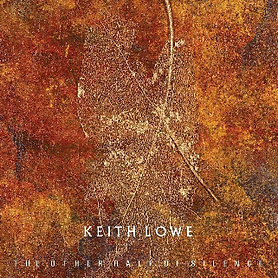
The cover to Keith Lowe's album The Other Half of Silence. Keep reading, because we have an Easter Egg for you below and it's a good one.
A capa do álbum de Keith Lowe The Other Half of Silence. Continua a ler, porque temos um Easter Egg para ti, em baixo -- e é bom mesmo.

Whether it's electric bass or acoustic bass, Keith Lowe is locked and loaded and ready to dish out all he's got no matter where he is expected to perform.
Quer seja em baixo elétrico ou baixo acústico, Keith Lowe está focado e preparado para dar tudo o que tem, onde quer que seja quando é chamado para atuar.

Keith Lowe at 11 years old.
Did he know what the future had in store for him?
Keith Lowe, com 11 anos.
Será que ele imaginava o que o futuro lhe reservava?
Special Interview with Mr. Keith Lowe
Coffee Time News
Keith Lowe: Filling the Silence With the Most Beautiful of Music
Keith Lowe: Enchendo o silêncio com a música mais bonita
For people from Seattle, Keith Lowe is a recognized musician whose contributions can be found throughout that great city's music scene. For fans of Fiona Apple, his supportive presence of that 90s vocalist's rise to fame was ever-present from live concerts to videos to TV appearances. For the general public, he is usually seen on his electric bass having played for such wonderful acts as the aforementioned Fiona Apple and alongside Seattle legend Shawn Smith, whose recognizable voice is still appreciated by dedicated fans who still mourn Mr. Smith's passing even though many years have already gone by. At the core of Mr. Lowe's musical talent is his classical music background, which can be so clearly heard in his solo release The Other Half of Silence. Coffee Time News did an interview spanning time zones as Keith Lowe from Seattle, Yuri Sundermeyer and Mariana Lopes from Portugal and Elis Lana, Cauã Lana and Nicholas Sung from Brazil all got together for a fun interview which we proudly present to you our wonderful readers. We hope you enjoy it and then take a few minutes to check out our favorite song by Mr. Lowe titled "Respair". It deserves all the attention it can get.
Para os habitantes de Seattle, Keith Lowe é um músico reconhecido, cujas contribuições podem ser encontradas por toda a cena musical dessa grande cidade.
Para os fãs de Fiona Apple, sua presença acolhedora — parte essencial da essência que ajudou a vocalista dos anos 90 a alcançar a fama — esteve sempre presente, dos concertos ao vivo aos vídeos e às aparições na TV. Para o público em geral, ele é normalmente visto a tocar baixo elétrico, tendo tocado com artistas incríveis como a já mencionada Fiona Apple e ao lado da lenda de Seattle, Shawn Smith, cuja voz marcante ainda é apreciada por fãs fiéis que continuam a lamentar a sua morte, mesmo após tantos anos. Na origem do talento musical do Sr. Lowe está a sua formação em música clássica, que pode ser claramente ouvida no lançamento a solo em The Other Half of Silence. A Coffee Time News fez uma entrevista atravessando fusos horários: Keith Lowe, de Seattle; Yuri Sundermeyer e Mariana Lopes, de Portugal; e Elis Lana, Cauã Lana e Nicholas Sung, do Brasil — todos juntos para uma conversa animada, que temos o orgulho de apresentar aos nossos maravilhosos leitores. Esperamos que gostem e que reservem alguns minutos para conhecer a nossa música favorita do Sr. Lowe, intitulada "Respair". Merece toda a atenção que puder receber.
ELIS LANA: How do you approach private rehearsals or practice sessions when you are alone, and band rehearsals with your bandmates? What do you try to do in private practice sessions to grow as a musician, and how does that differ from working in a band dynamic?
KEITH LOWE: Tough question first. Well, I’ll start with practicing by myself, which I don’t practice enough, I’ll tell you that right now, but when I do practice it’s usually to get ready for a session. I just came from a practice today to make a record with a wonderful female artist named Alex Guy. So, I want to be prepared when I show up to the rehearsals. I look at the rhythms, notes and chords and the forms and play along with whatever demo I’m given and just make sure it’s under my fingers and in my ears. We all tend to have our own musical language and when you work with other people I just like to make sure that my fingers are going to be able to play those things smoothly, if that makes sense, especially when there are written lines that I normally wouldn’t play. As a by-product you’re growing as a musician by doing that. So, then when you get to the rehearsal, it’s all about finding out what the team is doing, and the team being obviously the band members. And look to the artist who’s writing the material. You want to interpret their vision appropriately and do what you can to support, as a bass player, traditionally, I’m in a supporting role, so I want to make sure that what they’re playing… the more melodic instruments, that I’m supporting them and giving the music a nice foundation and trying to find little bits and pieces in the music that allow me to move things along a little bit.
ELIS LANA: Como aborda os ensaios privados ou as sessões de ensaio quando está sozinho, e os ensaios da banda com os seus colegas? O que tenta fazer em ensaios privados para evoluir como artista, e como é que isso difere de trabalhar numa dinâmica de banda?
KEITH LOWE: Primeira pergunta difícil. Bem, eu vou começar a falar sobre quando ensaio sozinho, o que não pratico o suficiente, vou-te contar isso agora mesmo, mas quando eu pratico normalmente é para me preparar para uma sessão. Acabei de voltar de um ensaio hoje, para gravar um disco com uma artista maravilhosa chamada Alex Guy. Por isso, quero estar preparado quando aparecer nos ensaios. Olho para os ritmos, as notas, os acordes e as formas, e toco por cima da demo que me derem, só para ter tudo nos dedos e no ouvido. Sabes, todos nós tendemos a ter a nossa própria linguagem musical e, às vezes, quando se trabalha com outras pessoas, a linguagem delas é diferente, então só gosto de ter a certeza de que os meus dedos serão capazes de tocar essas coisas suavemente, se isso faz sentido, especialmente quando há linhas escritas que normalmente não tocaria. Como consequência, ao fazer isso, tu cresces como músico. Então, quando se chega ao ensaio, tudo incide sobre descobrir o que a equipa está a fazer, e a equipa é obviamente composta pelos membros da banda. E olhar para o artista que escreveu o material, nesse caso, querer interpretar a sua visão apropriadamente e fazer o que puder para apoiá-lo, como baixista, tradicionalmente, desempenho um papel de apoio, então quero ter a certeza do que eles estão a tocar… os instrumentos com mais melodia, os quais apoio, dando à música uma boa base e tentando encontrar pequenos pedaços na música que me permitam fazer as coisas avançarem um pouco.
MARIANA LOPES: How many different styles of music have you seriously played over your career? Do you view your career in terms of different phases or has it been less defined than that?
KEITH LOWE: Awesome. Keyword here is how many styles have I “seriously” played, because I’m not very serious by nature. I feel like I’ve played a lot of different styles in my career. My trajectory from a very early age was to be a classical musician. I’m the youngest of five and my parents raised us all to be classical musicians. So, I did that into my twenties, and so that was a huge part of my musical background. That was definitely a stage or a phase. Then, I got into the freedom of rock and jazz, and then I developed an interest in country music. I think that I really just want to play as many musical styles as I can, because it’s fun. Music is so fun, and if I can play in a bunch of different settings, where each style brings or requires different skillsets… I believe it's really good for you. Is my career in phases or less defined? As my musical career rolls along, it’s not like I’m going, “Ok, next phase! I’m going to do this now!” I kind of just let all this happen to me, and it’s a result of just saying yes to every musical opportunity I could , so all the different styles kind of blend together. I’m sure in hindsight that there have been phases, but I certainly didn’t plan it that way.
MARIANA LOPES: Quantos estilos de música tocou seriamente ao longo da sua carreira? Pode afirmar que a sua carreira teve diferentes fases ou foi menos definida do que isso?
KEITH LOWE: O mais importante aqui é quantos estilos eu toquei “a sério” — porque, por natureza, não sou uma pessoa muito séria. Sinto que toquei muitos estilos diferentes ao longo da minha carreira. Desde muito cedo, o meu percurso foi sempre no sentido de ser músico clássico. Sou o mais novo de cinco irmãos, e os meus pais educaram-nos a todos para seguirmos música clássica. Por isso, fiz isso até aos vinte e tal anos, e isso foi uma parte enorme da minha formação musical. Foi, sem dúvida, uma etapa — ou uma fase.
Depois entrei no mundo da liberdade do rock e do jazz, e mais tarde comecei a interessar-me pela música country. Acho que, no fundo, o que eu quero mesmo é tocar o maior número possível de estilos musicais, porque é divertido. A música é tão divertida! E se eu puder tocar em vários contextos diferentes, onde cada estilo traz — ou exige — capacidades distintas… acredito que isso faz muito bem.
Será que a minha carreira teve fases, ou foi algo menos definido? À medida que a minha carreira musical foi avançando, não foi como se eu pensasse: “Ok, próxima fase! Agora vou fazer isto!” Não. Eu deixei que tudo isso acontecesse naturalmente. Foi o resultado de dizer sim a todas as oportunidades musicais que surgiram. Por isso, os diferentes estilos acabam por se misturar todos. Tenho a certeza de que, olhando para trás, houve fases, sim — mas garanto que nunca foi planeado assim.
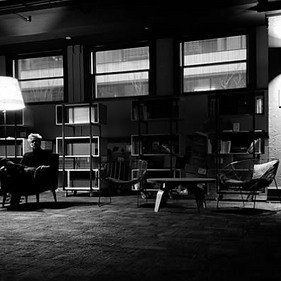
Where there is music, there is light and when Mr. Lowe is making the music it can be in any shade of rock, jazz, world music or country that he likes, because he has already dabbled in them all.
Onde há música, há luz. E quando o senhor Lowe cria música, pode ser em qualquer tom — rock, jazz ou qualquer outra -- porque ele já se aventurou em todas elas.
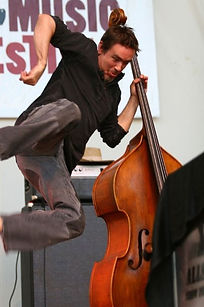
Keith Lowe knows this truth to be universal: "Music is life!"
Keith Lowe sabe que esta verdade é universal:
"A música é vida!"
NICHOLAS SUNG: I have read a bit about record companies, but don't completely understand how they work. What's the biggest benefit of having a contract with an established record company and does it pay off in the long run? Do you enjoy the business side of the music industry?
KEITH LOWE: Excellent. I’m not a businessperson, so I wouldn’t say I enjoy that part. I reap the benefits of it, but I’m not in there thinking I could do this or do that or I need to renegotiate something. I’ve been really blessed to be part of a record company or be an artist on a record company. When I put out my solo record which is called The Other Half of Silence, which is kind of Brad related, because Stone Gossard from Pearl Jam and Brad, and Regan Hagar from Brad and Satchel, who both run this record company called Loosegroove Records, and they asked me to put out a solo record, which is something that I don’t know if I ever would have done without their help and encouragement. They kind of approached me very gently saying, “Make a record! Make a record! Make a record! You play on so many other people’s records, it’s time for you to share your own voice”, so that was amazing, because they made it happen. They paid for a lot of it. There are some costs that get recouped by sales of my record and that’s fine. I’m not necessarily looking at that project as something to make money on. It’s more to expand my territory a little bit and my portfolio as it were. So, they really helped me by suggesting I do that record.
NICHOLAS SUNG: Li um pouco sobre as editoras discográficas, mas não compreendi completamente como funcionam. Qual é o maior benefício de ter um contrato com uma editora estabelecida e isso compensa a longo prazo? Gosta do lado comercial da indústria musical?
KEITH LOWE: Excelente. Eu não sou uma pessoa de negócios, por isso não diria que aprecio essa parte. É obvio que recebo os benefícios disso, mas não fico a pensar se poderia fazer isso ou aquilo ou a pensar em algo para renegociar. Sinto-me muito abençoado em fazer parte de uma editora discográfica ou ser um artista dessa editora. Quando lancei o meu álbum a solo, chamado The Other Half of Silence — que, de certa forma, está relacionado com os Brad — foi porque o Stone Gossard, dos Pearl Jam e dos Brad, e o Regan Hagar, dos Brad e dos Satchel, que geriam juntos a editora Loosegroove Records, me convidaram a fazê-lo. Acho que, sem a ajuda e o incentivo deles, talvez nunca o tivesse feito. Foi como se eles se aproximassem gentilmente, dizendo: “Faça um solo! Faça um solo! Faça um solo! Você toca em tantas bandas diferentes, já é hora de partilhar a sua voz”, então isso foi incrível, porque eles fizeram acontecer. Foram eles que pagaram bastante pelos custos. Há alguns custos que forma recuperados pela venda do meu álbum e isso foi muito bom. Não estou necessariamente a ver este projeto como algo para ganhar dinheiro. É mais para expandir um pouco o meu território e o meu portifólio. Eles deram-me uma grande ajuda, ao sugerirem que eu fizesse esse álbum.
Shawn Smith's musical contributions may not be well known to the general public, but they should be and Keith Lowe played a part in help Mr. Smith deliver his musical message. Check out this live video as the band Brad plays one of their many solid songs -- "Buttercup".
As contribuições musicais de Shawn Smith podem não ser amplamente conhecidas pelo público em geral, mas deviam ser — e Keith Lowe teve um papel importante ao ajudar o Sr. Smith a transmitir a sua mensagem musical. Espreita este vídeo ao vivo da banda Brad a tocar uma das suas muitas músicas sólidas — "Buttercup"..
Here is another good cut from Brad's United We Stand titled "Make the Pain Go Away".
Aqui está mais uma grande faixa do álbum United We Stand dos Brad, intitulada "Make the Pain Go Away".
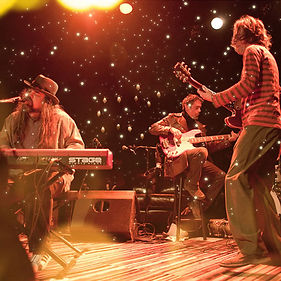
It looks like Shawn Smith, Keith Lowe and the band Brad are up to something magical as they cast a spell with the music they make. You can even see the energy floating in the air.
Parece que Shawn Smith, Keith Lowe e a banda Brad estão a tramar algo mágico, enquanto lançam um feitiço com a música que fazem. Consegue-se até ver a energia a flutuar no ar.
Shawn Smith was known for his work in both Satchel and Brad. The Satchel song "Mr. Pink" is one Brad will also play frequently.
Shawn Smith era conhecido pelo seu trabalho tanto nos Satchel como nos Brad. A música "Mr. Pink" dos Satchel é uma das que os Brad também tocam com frequência.
YURI SUNDERMEYER: You worked with Shawn Smith, who was a well-known vocalist from the Seattle area. What we have learned, from our interview with Michael Shrieve, social media commentaries and by simply watching the videos that feature him, is that for being a frontman, Shawn Smith had a humble spirit, which is usually not associated with lead singers, who always seem to be the cocky members of the bands. What do you remember from your time working with him? Also, his music talents were exceptional, so I was wondering if his humility was a factor in his bands not getting more attention on a larger scale? These are just my observations, so if I am incorrect, I apologize in advance.
KEITH LOWE: Okay, no apologies necessary on that. Yeah, Shawn was a beautiful spirit, and just a kind soul. He was very shy, but on the flip-side, there was something in him that made him feel like people should hear what he had to say. He definitely wasn’t boisterous about it, but he had a deep knowledge of himself and he had a beautiful message to share. He went about it in a different way, so he was humble, but he knew he had something. Some other singers I played with were always drawing attention to themselves, and Shawn, on stage, was a little bit like that because he loved being on stage delivering those powerful songs. You may have noticed I like to talk, and I’m jumping around, so I apologize in advance for all that. Shawn’s musical ability… he had a very specific style of playing the piano. It was sweetly simple but was perfect in the way it helped him to express the feelings in his songs, so he did that immaculately. It gave shape to all those songs. About his humility… in some ways his humility did affect his ability to reach a bigger market. People with a strong drive and a ‘healthy' ego tend to get out there a little more, but there were a couple of things, like in Satchel… I’ve talked with Regan, who’s the drummer in that band and with Brad, and he was kind of saying the band made some poor choices on opportunities that were offered, like “thanks for the offer, but no, we’re doing it this way.” And in hindsight maybe they shouldn’t have done that, maybe they should have accepted that tour that they offered or do this or do that differently, so every kind of move like that can affect things. And then in Brad’s case, there is a story that I think directly affects Brad’s somewhat limited audience… limited, but devoted and beautiful fans who are so dedicated. Let me tell a story, and I have the go ahead to tell it. This was when Pearl Jam had just got big and then Stone (Gossard) was like, “Hey, I love Satchel. I want to be in a band with Shawn,” and they made that first album which was incredible. Then the singer in Pearl Jam thought “Wait a minute, you’re going to promote that band and potentially hurt our band?” So, this has already been talked about in other interviews, Eddie got a little bit protective and told Stone that he couldn’t do any promo for Brad. I think that kind of hurt obviously, and if they treated that record as they had the other one… Pearl Jam’s… it would have made a lot of difference. It’s hard to tell, but that was definitely something in the beginning that affected things in the long run.
YURI SUNDERMEYER: Trabalhou com Shawn Smith, que era um vocalista conhecido de Seattle. O que aprendemos com a nossa entrevista a Michael Shrieve, com os comentários nas redes sociais e simplesmente ao ver os vídeos que o apresentam, é que, por ser vocalista, Shawn Smith tinha um espírito humilde, o que geralmente não é característico dos vocalistas, pois parecem ser sempre os membros arrogantes das bandas. O que se lembra do tempo em que trabalhou com ele? Além disso, os seus talentos musicais eram excecionais, por isso queria saber se a sua humildade era um fator para as suas bandas não receberem mais atenção, a uma escala maior. Estas são apenas as minhas observações, pelo que, se estiver incorreto, peço desde já desculpa.
KEITH LOWE: Ok, não precisas de pedir desculpa por isso. Sim, o Shawn era um espírito bonito e uma alma gentil. Era muito tímido, mas, por outro lado, havia algo nele que o fazia sentir que as pessoas deviam ouvir o que ele tinha para dizer. Definitivamente, não era espalhafatoso, mas tinha um conhecimento profundo de si mesmo e uma mensagem linda para partilhar. Transmitia isso de forma diferente — era humilde, mas sabia que tinha algo especial. Alguns dos cantores com quem toquei procuravam constantemente chamar a atenção para si próprios. O Shawn, no palco, também tinha um pouco disso — adorava estar ali, a entregar aquelas músicas poderosas. Talvez já tenham reparado que gosto de falar e que salto de um assunto para outro, por isso peço desculpa antecipadamente. A capacidade musical do Shawn… ele tinha um estilo muito específico de tocar piano. Era docemente simples, mas perfeito na forma como o ajudava a exprimir os sentimentos nas suas músicas. Fazia isso de forma impecável. Esse estilo dava forma a todas aquelas canções.
Quanto à humildade dele… em certa medida, essa humildade afetou a sua capacidade de chegar a um público mais vasto. Pessoas com uma motivação forte e um ego 'saudável' tendem a expor-se mais. Mas houve algumas situações, como no caso dos Satchel… Falei com o Regan — o baterista dessa banda e também dos Brad — e ele disse que a banda acabou por tomar algumas decisões infelizes em relação a oportunidades que surgiram, como por exemplo: “Obrigado pela oferta, mas vamos fazer à nossa maneira.” E, em retrospetiva, talvez não devessem ter feito as coisas daquela maneira. Talvez devessem ter aceitado aquela digressão que lhes foi oferecida, ou feito isto ou aquilo de forma diferente. Cada decisão como essa pode realmente influenciar o rumo das coisas. E, no caso dos Brad, há uma história que penso ter afetado diretamente o facto de terem um público algo limitado… limitado, mas extremamente dedicado e bonito — fãs verdadeiramente leais. Deixa-me contar uma história — tenho autorização para o fazer. Foi na altura em que os Pearl Jam tinham acabado de “rebentar” e o Stone (Gossard) disse: “Adoro os Satchel. Quero fazer parte de uma banda com o Shawn.” E então gravaram aquele primeiro álbum, que foi incrível. Mas depois o vocalista dos Pearl Jam pensou: “Espera aí… vais promover essa banda e isso pode prejudicar a nossa?” Isto já foi mencionado noutros sítios, mas o Eddie ficou um pouco protetor e disse ao Stone que não podia fazer promover os Brad. Penso que isso acabou por magoá-lo um bocado, obviamente. Se tivessem promovido esse álbum como fizeram com o dos Pearl Jam, teria feito uma grande diferença. É difícil saber ao certo, mas foi claramente algo, logo no início, que teve impacto a longo prazo.
ELIS LANA: I have listened to a bit of Satchel and a bit of Brad. They seem to be sister bands. Would that be a fair thing to call them or is there more to it than that? As a member of Brad, have you ever played Satchel songs?
KEITH LOWE: Yeah, they are definitely sister bands. Sometimes the only difference was the guitar player. Instead of Stone in Brad, there was somebody else in Satchel, John Hoag, and then Mike Berg, the second bass player in Brad, was also in Satchel. So, definitely sister bands, and in fact, an album got put out named Brad vs. Satchel. We did do a Satchel tune in Brad… “Mr. Pink” which was awesome.
ELIS LANA: Eu ouvi um pouco de Satchel e um pouco de Brad. Parecem ser bandas irmãs. Seria justo chamar-lhes isso ou há mais do que isso? Como membro dos Brad, já tocou músicas dos Satchel?
KEITH LOWE: Sim, são definitivamente bandas irmãs. Às vezes, a única diferença era o guitarrista. Em vez do Stone nos Brad, havia outra pessoa nos Satchel — o John Hoag — e depois o Mike Berg, o segundo baixista dos Brad, também fazia parte dos Satchel. Por isso, sim, eram claramente bandas irmãs. Aliás, chegou mesmo a sair um álbum chamado Brad vs. Satchel. Chegámos a tocar uma música dos Satchel com os Brad… “Mr. Pink”, que era incrível.
CAUÃ LANA : As a casual listener, I feel saturated by all the music out there. It just seems like there is so much out there and I know I can’t keep up with it all. Do you feel having so many free ways to listen to music is a good thing for the musicians? Do you feel fans can get too much of a good thing and not appreciate the music available to them?
KEITH LOWE: You can’t have too much of a good thing, as far as music is concerned, I think. One of the key elements of your question is that there are so many places to get free music and if it hurts the musicians. Yes, it does, because you’re getting it for free, so that kind of hurts musicians, but I belong to a streaming platform myself, where I pay pennies on the dollar for what I listen to. It’s just all too convenient sadly. In the days when record labels were really predominant, that would be how you would get music out. You just couldn’t do it without a record label, and then you couldn’t get your music played without a radio station without a label's help, so those forces kind of dictated what the new popular genre was going to be. You can peg musical styles like that: the sixties was psychedelic and the seventies was funk and the eighties was hair metal and the nineties was grunge and those were all really concise styles because of the way the music scene was set up and who was letting you listen to what they wanted you to listen to. Nowadays, just about anybody can put out a record, so there are so many different styles with no-one dictating by saying that this era will be a certain type of music. Now, granted, there are styles that people go for and grab onto, but yeah, there’s a lot out there and it can be hard to get heard for sure, but it's kind of great that you can pick and choose as a listener what you want to listen to and where you want to put your energy, and then you can be exposed to music you wouldn’t normally ever have heard otherwise. You can make choices and say, “Oh, I like that!” Then you can investigate it and I think it’s a good thing, although it makes it harder for musicians to get paid.
CAUÃ LANA: Como ouvinte casual, sinto-me saturado por toda a música que existe. Parece que há tantas coisas por aí e sei que não consigo acompanhar tudo. Acha que ter tantas formas gratuitas de ouvir música é uma coisa boa para os artistas? Acha que os fãs podem divertir-se demasiado e não apreciar a música disponível para eles?
KEITH LOWE: Não se pode ter coisas boas a mais — pelo menos no que toca à música, acho eu.
Um dos pontos-chave da tua pergunta é que hoje em dia há imensos sítios onde se pode ouvir música gratuitamente — e se isso prejudica os músicos? Sim, prejudica, porque estás a aceder à música sem pagar, e isso afeta os artistas. Eu próprio uso uma plataforma de streaming, onde pago um valor insignificante pelo que ouço. É tudo demasiado prático, infelizmente. Na altura em que as editoras dominavam o mercado, era por aí que a música chegava ao público. Simplesmente não se conseguia fazer nada sem uma editora, e depois também não se conseguia passar música na rádio sem a ajuda dessa editora, por isso essas forças é que acabavam por ditar qual seria o novo género popular. Esses fatores acabavam por ditar qual seria o novo género popular. Dá para associar estilos musicais a essas fases: os anos 60 foram psicadélicos, os 70 foram funk, os 80 foram hair metal e os 90 foram grunge — e todos esses estilos eram muito definidos por causa da forma como a indústria funcionava e de quem decidia aquilo que as pessoas podiam ouvir. Hoje em dia, praticamente qualquer pessoa pode lançar um álbum, por isso há imensos estilos diferentes, sem ninguém a ditar que esta será a Era de um certo tipo de música. Claro que há estilos pelos quais as pessoas se interessam e agarram, mas sim, há imensa coisa por aí e pode ser mesmo difícil ser ouvido, mas é um bocado fantástico que, enquanto ouvinte, possas escolher exatamente o que queres ouvir e onde queres investir a tua energia — e depois acabas por descobrir música que, de outra forma, nunca terias ouvido. Podes fazer escolhas e dizer, “Oh, eu gosto disto!” Depois podes investigar e penso que isso é bom, mas, no entanto, torna mais difícil que os artistas sejam pagos.
MARIANA LOPES: I know teens don’t really listen to the radio nowadays. If radio stations as you used to know them disappear in the near future, are you okay with that kind of development? What can traditional radio stations do to survive and remain relevant?
KEITH LOWE: Yeah, sometimes I’m amazed radio still exists. I used to listen to the radio a lot. Now I never do. I’m not necessarily proud of that. So, let’s see, I’m not a businessperson, but something off the top of my head would be for radio stations to sponsor local concerts with bands that are up-and-coming and bands that aren’t… sponsor concerts where you’re giving the chance for a lot of local bands to play in front of people, and I think that would go a long way to endearing radio to young music listeners.
MARIANA LOPES: Sei que os adolescentes não ouvem muito rádio hoje em dia. Se as estações de rádio, como as conhecia, desaparecessem num futuro próximo, sente-se bem com esse tipo de desenvolvimento? O que é que as estações de rádio tradicionais podem fazer para sobreviver e para continuar relevantes?
KEITH LOWE: Sim, às vezes fico mesmo surpreendido que a rádio ainda exista. Eu costumava ouvir muito a rádio , mas agora quase nunca ouço. Não é bem algo de que me orgulhe. Por isso, vamos lá ver... Eu não sou empresário, mas uma ideia que me ocorre seria as rádios patrocinarem concertos locais, com bandas emergentes e outras que já tenham algum percurso… patrocinar concertos onde dessem a oportunidade a muitas bandas locais de tocarem para o público. Acho que isso ajudaria muito a criar uma ligação mais forte entre a rádio e os jovens ouvintes de música.
YURI SUNDERMEYER: I have been playing the drums for over a year now. I always pay attention to drummers when I prepare for any interview. Regan Hagar? How would you describe him as a musician and drummer and what does he do that makes him a good bandmate? Is there anything you have learned from working with him?
KEITH LOWE: Regan is great. Regan is such a great guy and he’s a great drummer and he’s so unique. I don’t know if I’ll be able to tell you technically what he does, but his musical spirit is super open and he’s not locked into the idea that a certain song has to sound a certain way. He goes off his feelings. He feels how a song should sound and that is a beautiful gift for a band to have people like that who really feel what music should be. “This is what I really feel this song should be… something unique.” Regan had a lot to do with shaping songs in that regard and he taught me to be free like that and to try different things. It’s a really valuable tool and just his open spirit as a human being was something I took note of and it impressed me and made me want to make music with him.
YURI SUNDERMEYER: Eu toco bateria há um ano e presto sempre atenção aos bateristas quando me preparo para uma entrevista. Regan Hagar? Como é que o descreve como artista e baterista e o que é que ele faz que o torna um bom colega de banda? Aprendeu alguma coisa ao trabalhar com ele?
KEITH LOWE: O Regan é incrível. É mesmo excecional e um baterista espetacular, muito único. Não sei se vou conseguir explicar tecnicamente o que ele faz, mas o espírito musical dele é super aberto e não está preso à ideia de que uma determinada música tem de soar de uma certa maneira. Ele segue o que sente. Sente como é que a música deve soar, e é maravilhoso para uma banda ter pessoas assim, que realmente sentem o que a música deve ser. “Isto é o que eu realmente sinto que esta música deve ser... algo único.” O Regan teve muito a ver com a forma como as músicas foram criadas nesse sentido e ensinou-me a ser livre assim, a experimentar coisas diferentes. É uma ferramenta muito valiosa, e o espírito aberto dele enquanto pessoa, foi algo que me marcou, impressionou-me e fez-me querer fazer música com ele.
The video for Brad's "Waters Deep" gives the listener a good look at how the band operated. Regan Hagar is on drums and his contributions to music are sizeable and highly respected especially in the Seattle area. Keith Lowe is playing the bass with Shawn Smith doing what he did best... making each song sound special.
O vídeo de "Waters Deep" dos Brad dá ao espectador uma boa ideia de como a banda funcionava. Regan Hagar está na bateria e a sua contribuição para a música é significativa e muito respeitada, especialmente na área de Seattle. Keith Lowe está a tocar baixo, enquanto Shawn Smith faz o que fazia melhor... tornar cada música especial.
Keith Lowe enjoyed many good times playing with Fiona Apple. Enjoy this nice cut by Ms. Apple and keep an eye out for Keith Lowe who appears behind her on stage.
Keith Lowe teve muitos bons momentos a tocar com a Fiona Apple. Desfruta desta ótima música da Sra. Apple e fica atento ao Keith Lowe, que aparece atrás dela no palco.
Keith Lowe's early years were spent playing with Duffy Bishop and her formidable style can be seen here in this killer cut called "Louisiana Flood". You can see Keith Lowe on acoustic bass behind Ms. Bishop.
Os primeiros anos de Keith Lowe foram passados a tocar com a Duffy Bishop, e o seu estilo formidável pode ser visto aqui, nesta fantástica música chamada "Louisiana Flood". Podes ver o Keith Lowe no baixo acústico atrás da Sra. Bishop.
MARIANA LOPES: Have you ever performed with any female musicians? Is there anything in particular that a woman brings to a band and a man doesn’t? In asking this, I have Seattle's band Heart in mind. Would you happen to be a fan of that band?
KEITH LOWE: First of all, I love that band… Heart… really cool, I grew up with their music and I just frikkin’ love it. The first real band I was in was fronted by a powerhouse female vocalist, Duffy Bishop. I learned a lot about performing from my time with that band. She delivered all the time, no matter what and was a very powerful performer. We still play together sometimes! Right after that band I got the gig with Fiona Apple. We toured the world and she sold a lot of records and they’re really beautiful records. She is powerful in her own right but there was also a vulnerable side to her. Powerful yet introspective. I can’t speak to what women have as opposed to what men have, but to me there is a shared common ground with their creativity and their individual voice.
MARIANA LOPES: Já alguma vez tocou com uma artista? Acha que há algo em particular que uma mulher traz a uma banda e que um homem não traz? Estou a pensar, por exemplo, na banda Heart, de Seattle. Você é fã deles, por acaso?
KEITH LOWE: Antes de mais, adoro essa banda… os Heart. São mesmo incríveis — cresci a ouvir a música deles e simplesmente adoro. A primeira banda "a sério" em que toquei era liderada por uma vocalista com uma voz poderosa: a Duffy Bishop. Aprendi imenso sobre performance, no tempo em que passei com essa banda. Ela dava tudo em palco, sempre, acontecesse o que acontecesse — era mesmo uma intérprete cheia de força. Ainda tocamos juntos de vez em quando! Logo a seguir, consegui o trabalho com a Fiona Apple. Fizemos digressões por todo o mundo, e ela vendeu muitos discos — discos lindíssimos, aliás. Ela também tem uma presença forte, mas ao mesmo tempo havia um lado muito vulnerável nela. Poderosa, mas introspectiva. Não posso falar sobre o que as mulheres têm em comparação com os homens, mas para mim têm algo em comum — algo partilhado — na criatividade delas e na voz única de cada uma.
ss Kunkel, decidiu trazer o Russ. Todos nós temos como trabalho tocar, e fazemos o que fazemos como músicos, cabe ao produtor decidir a nossa participação e qual o projeto específico.
ELIS LANA: You are based in Seattle, Washington, which is famous for its cloudy and rainy weather. It also looks very green. Does that environment influence the music you make? Have you ever been someplace and had that location's spirit inspire you to make music?
KEITH LOWE: I love this question! They’re all great, but this one is really good. I’m going to talk about my solo record, because I think the area you’re in does influence you. I kind of hear people talking about grunge came out of rainy, overcast, dark weather. I believe surroundings do affect personalities and therefore artistic styles. For me, when I got asked to make a record, I never really composed anything before, so what I did was I went to a cabin on the Oregon coast, which is really beautiful and I was right on the ocean. I was up on a cliff overlooking the ocean and nothing else but beautiful clouds, sunsets, sunrises and the constant sound of the waves coming in and all I did was start playing in a way that I was affected by my surroundings. I played what I felt from what I saw. So, yeah, musical surroundings are interesting like that. For my next solo album, which I am going to record in July I'm going into an old abandoned house that hasn't been touched for at least fifty years where an old relative used to live. Everything is still in place that that those old relatives had and it’s just been empty for so long. I love the feeling of things like that. So, to me I felt that, “Oh, I’m going to pull something out of this environment that’s different than being on a cliff overlooking an ocean.” So, I didn’t want to go to the exact same place and make the same record. I wanted to try something different, so a different setting has a lot to do with what comes out.
ELIS LANA: Você está instalado na cidade de Seattle, Washington, que é famosa pelo seu clima nublado e chuvoso. Também parece ser um lugar muito verde. Esse ambiente influencia a música que você faz? Já esteve nalgum lugar em que o espírito desse local o inspirou a criar música?
KEITH LOWE: Adoro essa pergunta! São todas boas, mas esta é mesmo excelente. Vou falar sobre o meu disco a solo, porque acho mesmo que a zona onde estás influencia-te. Ouço muitas vezes as pessoas falarem de como o grunge nasceu daquele clima chuvoso, encoberto, escuro… e acredito que os nossos arredores afetam a nossa personalidade e, por isso, também o nosso estilo artístico. No meu caso, quando me convidaram para gravar um disco, eu nunca tinha realmente composto nada antes. Então, o que fiz foi ir para uma cabana na costa do Oregon — um sítio lindíssimo — mesmo em frente ao oceano. Estava no alto de uma falésia a olhar o mar, sem nada à volta, a não ser nuvens maravilhosas, pores e nasceres do sol, e o som constante das ondas a bater. E tudo o que fiz foi começar a tocar, de acordo com o que sentia naquele ambiente. Toquei o que via e sentia. Por isso, sim — o ambiente musical tem mesmo impacto. Para o meu próximo disco a solo, que vou gravar em julho, vou-me instalar numa casa antiga e abandonada, que está intocada há pelo menos cinquenta anos — onde vivia um familiar meu. Está tudo ainda no lugar, tal como os antigos familiares deixaram, e tem estado vazio há tanto tempo. Adoro esse tipo de atmosfera. Então pensei: “Quero tirar algo deste ambiente — algo diferente do que tirei de uma falésia sobre o mar.” Não quis voltar ao mesmo lugar e fazer o mesmo disco. Queria experimentar algo novo. E acredito mesmo que um cenário diferente muda tudo o que sai de ti.
NICHOLAS SUNG: We have seen that you have toured in many places including in Europe. How did your Seattle bands cultivate fans in such places as Florence, Italy? How does that work? How do bands know it is worth their time and gas money to go to a new or different markets to perform?
KEITH LOWE: Yeah, I have played in Lisbon. I just wanted you to know. It was with a singer named David Sylvian. He is so great! I did a record with him called Snow Borne Sorrow. I lived out at his place for a couple of months to make that record and toured with him a couple of times. With him, he’s well-known and so you can go to far off places, especially in Europe. We had bigger audiences over there than we did in the States. So, with Seattle bands, like with Brad, there’s a big underground following and some of that is because of Stone (Gossard) being in Pearl Jam and maybe that’s why people took notice of that band in the first place, or maybe they learned that Stone was in it later on. It’s not necessarily just him, because the music was high quality. We had a nice following in Europe for whatever reason We took a chance, not knowing quite knowing how it was going to go, but we had a really good offer… we opened for the same band, New Killer Shoes, every night and that band kind of made that tour happen because they felt we would both benefit. They offered to take care of a lot of stuff, which made us think it’d be silly to not do it. And that’s great that they did that. As far as with other bands… well, I’ve had friends in bands that tour in Europe and you just got to get heard somehow first, before you get seen. I think you kind of have to get a ground level support going with people listening to you and develop that over time and maybe you go over to Europe knowing you’re going to lose money, but you want more people to see you, so you kind of keep doing things like that and try to build a following. Again, I’m no business person, but it seems to be that you really have to take a chance and then keep working it.
NICHOLAS SUNG: Vimos que já fizeste digressões por muitos lugares, incluindo na Europa. Como é que as tuas bandas de Seattle conseguiram conquistar fãs em sítios como Florença, em Itália? Como é que isso funciona? Como é que uma banda sabe que vale a pena o tempo e o dinheiro da gasolina, para ir tocar num mercado novo ou diferente?
KEITH LOWE: Sim, já toquei em Lisboa. Queria só que soubesses disso! Foi com um cantor chamado David Sylvian. Ele é incrível! Gravei um disco com ele, chamado Snow Borne Sorrow. Morei na casa dele durante uns dois meses, para fazermos esse álbum, e depois ainda fizemos algumas digressões juntos. Com ele, como é bastante conhecido, consegues ir a sítios bem distantes — especialmente na Europa. Tínhamos públicos maiores por lá do que nos Estados Unidos. No caso das bandas de Seattle, como os Brad, havia (e ainda há) um grande público underground, e parte disso pode ter sido por causa do Stone (Gossard), por ele fazer parte dos Pearl Jam. Talvez tenha sido isso que levou algumas pessoas a repararem na banda, desde o início… ou talvez só mais tarde tenham percebido que ele também estava envolvido. Mas não era só por causa dele — a música era mesmo de alta qualidade. Tínhamos um público muito bom na Europa, por qualquer razão. Arriscámos, sem saber muito bem como ia correr, mas tivemos uma proposta muito boa… abrimos todos os dias para a mesma banda, New Killer Shoes, e foi essa banda que, de certa forma, fez a tour acontecer porque achavam que ambos íamos beneficiar. Ofereceram-se para tratar de muitas coisas, o que nos fez pensar: “Seria parvo não aceitar.” E ainda bem que o fizemos. Quanto a outras bandas… conheço amigos que tocam na Europa, e a verdade é que primeiro tens de ser ouvido, antes de seres visto. Acho que é preciso construir uma base de apoio, com pessoas a ouvirem-te, e isso leva tempo. E talvez vás para a Europa já a contar que vais perder dinheiro, mas queres que mais gente te veja — então continuas a fazer essas apostas, a tentar ganhar seguidores. Não sou um homem de negócios, mas parece-me que tens mesmo de arriscar e continuar a trabalhar nisso.
Keith Lowe toured Europe with David Sylvian on his "The World is Everything" tour, and also his tour "Everything and Nothing". This live video was shot in Eindhoven and we can see Mr. Lowe playing bass on the right-hand side of the screen. Keith Lowe has had the opportunity to play in both Lisbon and Braga in Portugal.
Keith Lowe fez uma digressão pela Europa com David Sylvian na sua tour "The World is Everything", assim como na tour "Everything and Nothing". Este vídeo ao vivo foi gravado em Eindhoven, onde podemos ver o Sr. Lowe a tocar baixo no lado direito do ecrã. Keith Lowe teve também a oportunidade de tocar tanto em Lisboa como em Braga, em Portugal.
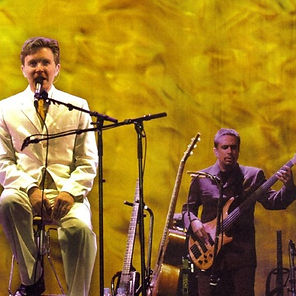
Keith Lowe playing live with David Sylvain.
Keith Lowe a tocar ao vivo com David Sylvian.
Keith Lowe also did shows in Europe with the band Brad featuring Shawn Smith. This video taken by a fan shows what Mr. Lowe brought to the table when he played live with Brad. Watch this short video and enjoy the riff that Keith is creating.
Keith Lowe também fez concertos na Europa com a banda Brad, que contava com Shawn Smith. Este vídeo, gravado por um fã, mostra o que o Sr. Lowe trazia para o palco quando tocava ao vivo com os Brad. Veja este pequeno vídeo e desfrute da faixa que o Keith está a criar.

OUR EASTER EGG WHICH IS BETTER THAN ANY KINDER SURPRISE YOU COULD FIND. CHECK OUT WHAT WE HAVE FOR YOU!

Use this link to visit Keith Lowe's Bandcamp page: https://keithlowe.bandcamp.com/album/the-other-half-of-silence
Use esta link para visitar a página do Keith Lowe no Bandcamp:
https://keithlowe.bandcamp.com/album/the-other-half-of-silence
MARIANA LOPES : Some people say that “music is their religion”. Do you agree with this quote and mentality? If music is a religion, what should it be preaching?
KEITH LOWE: Really great question. I don’t believe in religion, but I do believe music is a super deep spiritual thing for me. It’s why I’m here on the planet, so it’s a big thing and you can call it religion or just a spiritual calling. As far as the message I’m trying to put out there, the older I get the more I just want to have fun and present joy, because I think the world needs that. That’s what I would like to communicate and just creativity and living a creative life that’s worthwhile. It can’t help but have a rippling impact when you play for people.
MARIANA LOPES: Algumas pessoas dizem que “a música é a sua religião”. Concordas com essa frase e com essa forma de pensar? Se a música fosse uma religião, o que achas que ela deveria pregar?
KEITH LOWE: Pergunta mesmo excelente. Eu não acredito em religião, mas acredito que a música é algo profundamente espiritual para mim. É a razão pela qual estou aqui neste planeta, por isso tem um peso enorme — e podes chamar-lhe religião ou apenas uma vocação espiritual. Quanto à mensagem que tento transmitir, à medida que vou envelhecendo, só quero mesmo divertir-me e transmitir alegria, porque acho que o mundo precisa muito disso. É isso que gostaria de comunicar — e também a criatividade e a importância de viver uma vida criativa com sentido. Quando tocas para outras pessoas, isso inevitavelmente tem um impacto que se espalha, uma espécie de efeito dominó.
ELIS LANA: I have read that music reveals one's soul. Would you say that is true? Do you think that all musicians are actually revealing their souls as they play or is that a bit overdramatic?
KEITH LOWE: No, I don’t think it’s overdramatic at all… and that’s the beauty of any kind of art. It’s that you’re drawn to make and create and you’re drawn to it and you’re compelled to present it no matter what art form it is… music or painting or sculpture or whatever. You’re feeling the need to express it. So, it’s definitely your soul. So, not overdramatic, your art is an expression of your soul.
ELIS LANA: Eu tenho lido que a música revela a alma da pessoa. Você diria que isso é verdade? Você acha que todos os músicos, na verdade, revelam suas almas enquanto tocam, ou isso é um pouco dramático demais?
KEITH LOWE: Não, não acho nada exagerado… e essa é precisamente a beleza de qualquer forma de arte. Há algo que te puxa para criar, uma força interior que te impulsiona, e sentes-te compelido a mostrar isso, seja qual for a forma de arte — música, pintura, escultura, o que for. Sentes a necessidade de te expressar. Por isso, sim, é definitivamente a tua alma. Não é exagero nenhum — a tua arte é uma expressão da tua alma.
CAUÃ LANA: Do you like world music? Have you ever taken the time to check out Brazilian music at all? If so, what do you like about it?
KEITH LOWE: I love world music and I’ve played in an African soukous band and that was a lot of fun. It was just so different than what I was used to. The rhythms were so compelling and exciting. I play some Brazilian music with a guy here in Seattle called Marco (de Carvalho), who’s from Brazil and a brilliant guitar player and I love it when I get to play Brazilian music. I don’t pretend that I do it authentically, but I try to get as close as I can and luckily I play with people who are very patient and gently tell me the rules or parameters of what makes Brazilian music Brazilian. So, I love it. It’s passionate. It makes my body move and I love that about it.
CAUÃ LANA: Você gosta de música do mundo? Já teve a oportunidade de conhecer a música brasileira? Se sim, o que você gosta nela?
KEITH LOWE: Adoro música do mundo e já toquei numa banda africana de soukous, o que foi muito divertido. Era algo completamente diferente do que eu estava habituado. Os ritmos eram muito cativantes e entusiasmantes. Também toco um pouco de música brasileira com um músico aqui em Seattle chamado Marco (de Carvalho), que é do Brasil e um guitarrista brilhante — e adoro sempre que tenho a oportunidade de tocar música brasileira. Não finjo que a toco de forma autêntica, mas tento chegar o mais perto possível e, felizmente, toco com pessoas muito pacientes, que me explicam com gentileza as regras e os parâmetros que fazem da música brasileira aquilo que ela é. Adoro isso. É uma música cheia de paixão. Faz o meu corpo mexer-se — e isso é algo que adoro nela.
YURI SUNDERMEYER: Of all the projects you have participated in, which one do you wish would have gotten more attention?
KEITH LOWE: Let’s see, there’s a band I play in called Braly Sangster who I’ve done some records with. I think those albums are really great. I just wish they would get more attention. Any musical project I’ve been involved in is dear to me and I wish they’d all do great. I also wish my solo album was getting played more, but it’s a very specific genre. There’s a new Alex Guy album coming out I played on and I hope that gets some attention. It’s really amazing.
YURI SUNDERMEYER: De todos os projetos dos quais você participou, qual você gostaria que tivesse recebido mais atenção?
KEITH LOWE: Vamos ver, tem uma banda na qual eu toco chamada Braly Sangster, com a qual gravei alguns discos. Acho que esses álbuns são realmente ótimos. Só queria que recebessem mais atenção. Todo projeto musical do qual participei é muito querido para mim, e eu gostaria que todos tivessem grande sucesso. Também gostaria que meu álbum solo estivesse sendo mais tocado, mas é de um gênero bem específico. Vai sair um novo álbum da Alex Guy no qual eu toquei, e espero que ele receba atenção. Está realmente incrível.
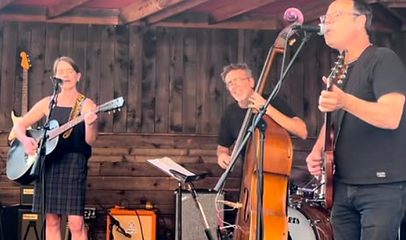
Keith Lowe enjoys his work with the Seattle band Braly Sangster.
This photo captures the rapport the band members share. Check out the YouTube video to listen to a bit of their fine music.
Keith Lowe diverte com o seu trabalho na banda de Seattle Braly Sangster. Esta fotografia capta a cumplicidade entre os membros da banda. Veja o vídeo no YouTube para ouvir um pouco da sua boa música.
NICHOLAS SUNG: I don't play a musical instrument, but I play basketball and I imagine musicians and athletes have one thing in common... there are many of them, but few really make it. What was the key for you in making it as a musician?
KEITH LOWE:
Awesome. Yeah, so few “make it”. You know, a lot of getting noticed by people who could further your career… it’s a little bit of luck. Actually, it’s a lot of luck, but also to back that up you have to have talent. A thing that really helped my career was getting that early gig with Fiona Apple and I got that because the drummer on the record recommended me. We had played together before, so he recommended me and that led to other things. I got seen in that and people reacted to that, “Oh, he’s a touring musician.” So, one thing led to another and it kind of goes like that a little bit, you hope. First and foremost, you have to have the goods. There’s an equation, which basically says it’s a mix of luck and skill. Another thing I did was just say yes to everything. I wanted to play music, so anything that was presented to me I would say, “Yes, I’ll do it.” And then you start to be known as a musician that plays many styles of music. It’s important to be versatile. Saying yes all the time has done me very well.
NICHOLAS SUNG: Eu não toco um instrumento musical, mas eu jogo basquete e eu imagino que atletas e músicos têm algo em comum... há tantos deles, mas poucos realmente ativem o sucesso. Qual foi a peça-chave para você ter tido sucesso como músico?
KEITH LOWE: Fixe. Pois, são mesmo muito poucos que “conseguem”. Sabes, grande parte de ser notado por pessoas que podem impulsionar a tua carreira… é um bocado de sorte. Na verdade, é muita sorte, mas para acompanhar isso tens de ter talento. Uma coisa que realmente ajudou a minha carreira foi conseguir aquele trabalho inicial com a Fiona Apple, e consegui porque o baterista do álbum me recomendou. Já tínhamos tocado juntos antes, por isso ele recomendou-me, e isso levou a outras oportunidades. Fui visto aí, e as pessoas reagiram assim: “Oh, ele é um músico de digressão.” Então, uma coisa levou a outra, e as coisas funcionam mais ou menos assim, espera-se. Em primeiro lugar, tens de ter qualidade. Há uma fórmula que basicamente diz que é uma mistura de sorte e talento. Outra coisa que fiz foi dizer sim a tudo. Queria tocar música, por isso qualquer coisa que me aparecesse eu dizia: “Sim, faço isso.” E depois começaste a ser conhecido como um músico versátil, que toca vários estilos. É importante ser versátil. Dizer sempre sim fez-me muito bem.
Similar to so many Seattleites, Keith Lowe grew up a Seattle Supersonics fan and Cauã and Nicholas tried hard to makes connection between Keith loving the Sonics and how it might have influenced him as a musician. We will let you, our loyal readers, decide if there is a connection or not.
Tal como muitos habitantes de Seattle, Keith Lowe cresceu como fã dos Seattle Supersonics, e o Cauã e Nicholas esforçaram-se por encontrar uma ligação entre o amor do Keith pelos Sonics e a forma como isso pode tê-lo influenciado enquanto músico. Vamos deixar para vocês, nossos leitores fiéis, a decisão sobre se essa ligação existe ou não.
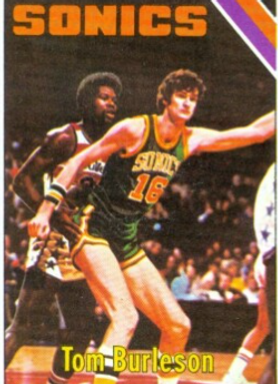
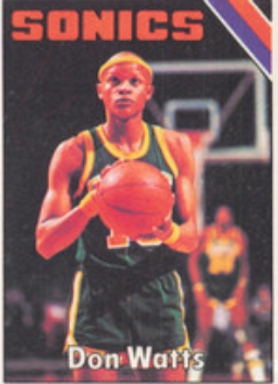
CAUÃ LANA: I also play basketball. I apologize for going off topic, but I was curious if you were ever a Seattle Supersonics fan? If so, did you have a favorite player? If, by chance, you were an athlete, what would be your walk-up song? You know, that song that players identify with to get pumped up to play?
KEITH LOWE: Yeah, I was a Supersonics fan when I was a kid, because my dad would take me to the games, and I’m talking when I was really little, like when I was probably ten. Back then, there was a guy named Tommy Burleson, and he was just a freaking giant and I just thought as a little kid that that guy was a freak. It was cool. So, I liked him, even if he wasn’t one of the best players, but I identified with him, because he was different. There was another player named Slick Watts, who I loved. Bald guy… little, just freaking great. He was exciting and I latched onto him. That was more when I was in junior high or a little bit later. Bill Russell played professionally and then he was the coach of the Sonics for a while and I ran into him at a grocery store which was fun. That whole world was exciting. When I was with Fiona, we played some really big shows, like opening for the Rolling Stones at Madison Square Garden, and a bunch of TV shows and you had to get pumped up, because you’re going from sitting around in a tour bus all day and then suddenly you have to play live and nail it. So, I would put on Soundgarden’s Badmotorfinger, because that album just kicked ass and it really made me go, “Let’s freaking do this!” So that’s an album that helped me in those situations.
CAUÃ LANA: Eu jogo basquetebol. Desculpa estar a fugir ao assunto, mas fiquei curioso — alguma vez foste fã dos Seattle Supersonics? Se sim, tinhas algum jogador favorito? E se, por acaso, fosses atleta, qual seria a tua walk-up song? Sabes, aquela música com que os jogadores se identificam para se motivarem antes de entrar em campo?
KEITH LOWE: Sim, eu era fã dos Supersonics quando era miúdo, porque o meu pai levava-me aos jogos — estou a falar de quando eu era mesmo pequeno, talvez com uns dez anos. Naquela altura havia um jogador chamado Tommy Burleson, que era simplesmente um gigante, e eu achava, como miúdo, que ele era um autêntico fenómeno. Era fixe. Gostava dele, mesmo que não fosse dos melhores jogadores, mas eu identificava-me com ele por ser diferente. Havia outro jogador chamado Slick Watts, que eu adorava. Careca, baixinho... simplesmente espetacular. Era entusiasmante vê-lo jogar e eu liguei-me a ele. Isso já foi mais quando andava no ciclo ou um pouco depois. O Bill Russell também jogou profissionalmente e depois foi treinador dos Sonics durante algum tempo. Cheguei a encontrá-lo uma vez num supermercado — foi divertido. Todo esse mundo era super entusiasmante. Quando andava em digressão com a Fiona, tocávamos em palcos muito grandes — abrimos, por exemplo, para os Rolling Stones no Madison Square Garden, e também fizemos vários programas de TV. E aí tens mesmo de te motivar, porque passas o dia inteiro sentado num autocarro de digressão, e de repente tens de entrar em palco e arrasar. Então, o que eu fazia era pôr o álbum Badmotorfinger dos Soundgarden — aquele álbum dá-te mesmo energia. Fazia-me pensar: “Bora lá, vamos com tudo!” Esse álbum ajudou-me muito nessas situações.
Coffee Time News
Contributors

CAUÃ LANA

ELIS LANA

MARIANA LOPES

NICHOLAS SUNG

YURI SUNDERMEYER
